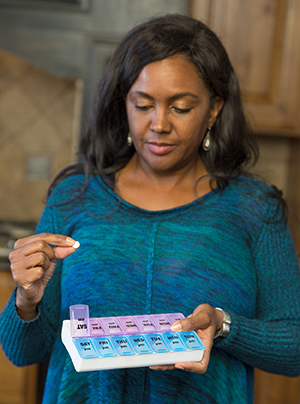Taking your medicines
After your bypass surgery, you may be given prescriptions for new medicines when you leave the hospital. Take each one as directed. Keeping a chart or putting your pills in a 7-day pill box can help you remember. Be sure to take your pain medicines before the pain gets too severe, and before activity.
Relieving pain
If you have pain around your incisions or in your chest, your healthcare provider may prescribe a pain reliever. Be sure to take it exactly as directed. A gentle back rub may help relax sore muscles in your back and shoulders. If the surgeon used a mammary artery, you may feel a pulling or tightness in the front of your chest on the side the artery was used. You can use a warm pack to ease the tightness. Ask your provider how to use a warm pack. You may be tempted to loosen your muscles by taking a hot shower or soaking in a tub, but don't do this until your surgical team says it's OK.
Some pain relievers can cause nausea and constipation. Take pain relievers with food and eat more fiber. Whole fruits and vegetables are good choices for fiber. Your healthcare provider may prescribe a laxative and stool softener.
As your breastbone heals
Don't be surprised to feel sharp pains in your chest as the breastbone heals. Even changes in the weather can make the incision hurt. These pains feel different from angina and are most likely not signs of a heart attack. If you have questions about what you're feeling, or if medicines are not enough to manage your pain, call your healthcare provider.
Call 911
Call
-
Pain that is typical for your angina and doesn't quickly go away with medicine or rest
-
Chest pain that is new, abnormal, or getting worse
-
Trouble breathing that is new, abnormal, or getting worse
-
Uncontrollable bleeding from a wound
-
Dizziness or faintness that doesn't quickly go away with sitting or lying down
Featured in


